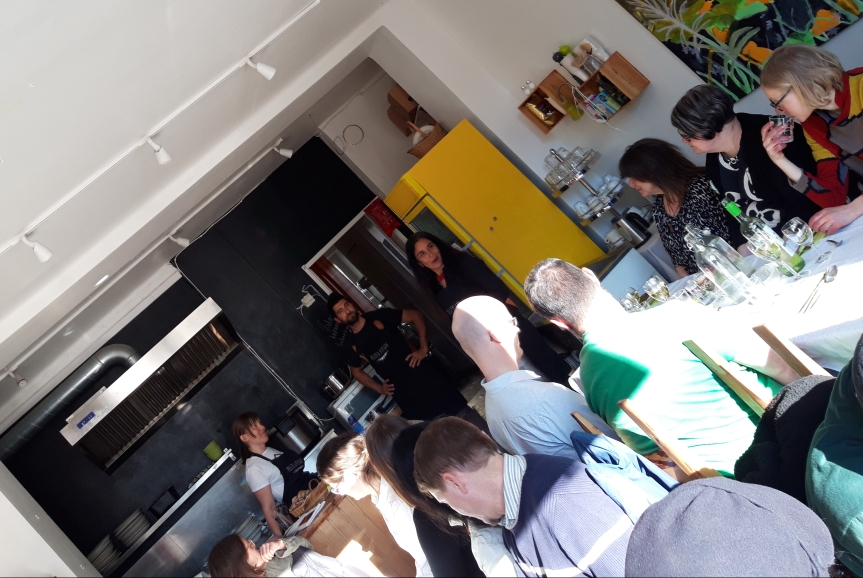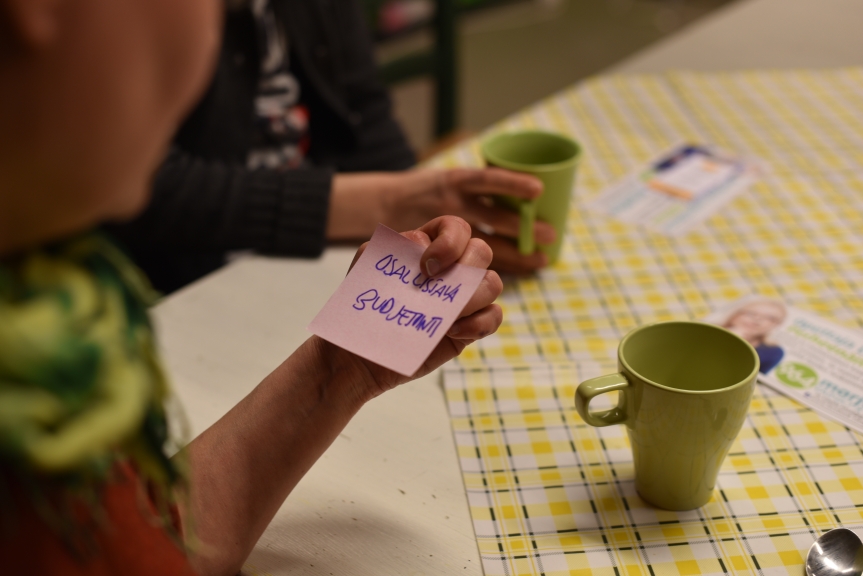This essay is based on the master’s thesis I wrote last year, and it aims to investigate Solidarity Economy in a Nordic welfare model and open ground for future research. The master’s thesis, titled “Solidarity Economy in the context of the Nordic welfare state”, was published last September and is available on the website of Tampere University.
My motivation to write a master’s thesis about transformative economic practices stems from my previous involvement with Solidarity Economy in Brazil, my home country. After many years of work experience in a multinational organization and some other years in smaller private companies, I learned through a local Solidarity Economy network that another type economy is possible. A kind of economy that puts the human well-being in first place and prioritizes the cooperation, democratic values, and the environment over the maximization of profits, wealth accumulation and competition.
More importantly, Solidarity Economy is not just a utopian framework; rather it exists as several local economic practices such as time bank, alternative currency, community supported agriculture, workers’ cooperative, community currency, collective kitchen, and community garden. These self-managed practices that are often seen as something peripheral to the dominant economy turn out to be at the forefront. Ordinary people become the central actors to shape the economy in which they are involved. In this way, Solidarity Economy is an alternative that can reshape the economy in a decentralized and bottom-up manner. At the same time, it promotes a more democratic, egalitarian, and cooperative economy.
As many of the academics, activists, workers, and even some policy makers who advocate Solidarity Economy, I consider that our current economic system is socially and environmentally weak and needs to be transformed. Therefore, when I moved to Finland to take my master’s program at the Tampere University, I was determined to explore Solidarity Economy from the perspective of the global north. In fact, Solidarity Economy still lacks deeper studies in such contexts, even despite the growing interest in it by different sectors of society.
It was after a key speech of Ruby van der Wekken, an inspiring activist, where she presented some great initiatives placed in Finland (Oma Maa and Stadin Aikapankki) that my curiosity to explore Solidarity Economy in a Nordic welfare state arouse. As I previously mentioned, I come from Brazil where Solidarity Economy often rises to tackle social issues, economic crises, and the incapability of governments to provide its citizens the basic needs. Solidarity Economy in Brazil has been a vibrant movement since the early 2000s and has empowered vulnerable individuals who are excluded from the formal economy.

However, Solidarity Economy does not only aim to mitigate crises and the lack of capacity of governments as it often happens in South America. There is a risk that Solidarity Economy may lose one of its main purposes, which is to promote democratic and egalitarian ways to reorganize the economy, and can become a complementary rather than a transformative approach (Singer, 2002). So that, investigating a context of low social vulnerability such as the Nordic welfare model in which the states have been able to provide their citizens high standard of livelihood, is fundamental to understand the potential of Solidarity Economy as a real transformative approach. In the Nordic welfare, Solidarity Economy may be stronger founded on individuals’ conscious choice rather than their necessity.
Taking the above argument into consideration, in my research, I analyze how the Nordic welfare state enables and undermines the development of Solidarity Economy. The study focuses on Solidarity Economy actors in Finland. Therefore, to enrich the debate, it would be valuable to have further studies based on the views of non-actors (e.g. policy makers, academics, public servants, civil society), especially because the intensification of social and environmental crises has raised the interest in novel ways of consuming, producing, and living. There are many people unsatisfied with the outcomes of capitalism, but they are not aware of systemic alternatives such as Solidarity Economy.
My research departs from two antagonist hypotheses. On one hand, the Nordic welfare can be fertile for Solidarity Economy because knowing that a high level of social security and quality of public service provision is available, as well as the high amount of trust on authorities, may give ground to individuals to transform the local economy according to their desires and values. It is important to remember that the development of Solidarity Economy, usually, takes place on opposite contexts of high social vulnerability (e.g. poverty, social inequality and economic crises) and weak governance.
On the other hand, there is evidence that where states provide effective social public policies the appeal for Solidarity Economy tends to decline (Utting et al. 2015, p. 11). The roots of Solidarity Economy are highly related with the workers struggle and vulnerable people seeking better life conditions. The resilience of individuals as well as their needs have been crucial aspects for the emergence and continuity of Solidarity Economy.
The analysis of my research, to a good extent, supports the statements above, but adds other relevant missing factors. In addition, the analysis suggests alternative ways of doing things in the traditional Nordic welfare society by pointing out certain policies that can provide more solid directions to the development of Solidarity Economy.
Advantages and Obstacles
Indeed, the high level of quality of life, as well as the public service provision, social security and certain infrastructure (e.g. library system and easy access to information) can enhance the capability of individuals to promote Solidarity Economy. Within this structure, individuals can devote much of their skills, time and effort to develop Solidarity Economy without the major pressure to overwork to secure their basic needs. However, the same scenario may produce the perception that substantial structural changes, such as the transformation of the dominant economic system, are not necessary. It can discourage individuals to seek what can be considered radical approaches.
Furthermore, in addition to the high amount of trust of civil society on the public authorities, the fact that a society has evolved with a central role of the government and the perception that the government has to lead the attempts to solve societal issues, may undermine alternatives that rely on self-organization. It is important to add, though, that Solidarity Economy also relies on effective public policies. The challenge is to find a common ground where the implementation of policies does not become an imposition and fail to consider the people on the ground, while the limitations of the public sector are respected (Mendell and Alain, 2015).
The lack of financial resources is another identified aspect that can undermine the development of Solidarity Economy practices. This issue can result in the loss of autonomy and push organizations to abandon their principles. As it happens elsewhere, also in Finland the Solidarity Economy organizations struggle to maintain their principles and be economically self-sustainable at the same time.
Cooperatives are strongly rooted in Finland and definitely have a broad capacity to reach many sectors of society. For those who are not familiar with the Solidarity Economy network of Finland, it is important to say that the concept is still little known in the country and encompasses a few initiatives; there is not a single workers’ cooperative, for example. The incorporation of cooperatives in the Solidarity Economy network can support the movement to reach a broader texture in the Finnish society.
This point deserves an emphasis because cooperatives (or organizations that are named cooperatives) commonly drop the cooperative principles and adopt market-based values. The challenge, then, is to find mechanisms to include cooperatives in a way that strengthens Solidarity Economy as well as the included cooperatives, but at the same time do not delegitimize the movement and its goals.
Obviously, Solidarity Economy is not the only grassroots movement, and Finland has other movements that share common principles and goals, but they are fragmented. There is a possibility of synergy between Solidarity Economy and similar movements in a way that can strengthen all parties.
Finally, the individuals who experienced the controversial Soviet Union may associate the word solidarity (solidaarisuus in Finnish) with the communist discourse of that time and may not perceive solidarity as a positive value; instead, they may perceive it as something negative and even intimidating. Thus, the development of Solidarity Economy in Finland can already meet certain resistance because of the word solidarity itself, even despite this issue concerns a specific group of individuals.
However, the consolidation of the name Solidarity Economy does not seem to be the priority among the actors: it appears to be more relevant to focus on the values, which should be antagonist to the dominant economic values, and be open for many terminologies that also work towards similar goals. I was glad to hear this because often happens that the search for a refined concept dictates the debate. Gibson-Graham (Miller, 2013) brilliantly challenges us by asking: “if our desire for “strong theory” is not sometimes a means for evading the hard, messy, and humble work of building transformative relationships, organizations, and movements in our actual places”.
Promoting structural changes
Taking into account all the challenges that Solidarity Economy may face due to bureaucracy, financing, difficulty in forming broad and consistent networks, lack of visibility, marginalization and informality, the government becomes a fundamental enabling actor. It is hard to believe that Solidarity Economy as whole, rather than isolated initiatives will scale up without the implementation of public policies in partnership with Solidarity Economy actors.
The thesis identifies some doable policies that can support Solidarity Economy. They can be a challenge to the traditional Nordic welfare society which often has implicit norms of how things should be done.
They encompass promoting mechanisms that differentiate value-based from conventional market-based organizations. These measures would include
- providing tax benefits to the value-based organizations, which also include Solidarity Economy,
- making available free spaces and subsidies of rents to Solidarity Economy practices and similar,
- creating university incubators which via academic and technical expertise foment the development of Solidarity Economy organizations,
- creating a public department that works as a platform for policy makers, actors and citizens work together to develop Solidarity Economy (and/or alike practices); and
- promoting participatory budgeting where ordinary citizens take part in the decision-making process of allocation of public expenditure.

This list is not exhaustive; I can add, for example, other policies such as financing via public banks and public procurement in close cooperation with Solidarity Economy organizations. All these policies can be found in other countries. Definitely, it is important to take into consideration that Solidarity Economy has strong foundations on the community level where its emergence relates to local common interest. Thus, the implementation may vary according to each location, but the core here is to show that there are many feasible pathways to scale up Solidarity Economy and similar practices.
We cannot forget, though, that Solidarity Economy has the people on the grassroots level as protagonists, rather than the state. That is how Solidarity Economy aims to shift the current dominant economic system into something more democratic, equal and plural.
Garbiel Esber Elias
References
Mendell, M. & Alain, B. (2015). Enabling the social and solidarity economy through co-construction of public policy. In Social and solidarity economy: beyond the fringe.
Miller, E. (2013). Community Economy: Ontology, Ethics, and Politics for Radically Democratic Economic Organizing.
Singer, P. (2002). Introdução a economia solidária.
Utting, P., van Dijk, N., &Mathei, M.-A. (2014). Social and solidarity economy: Is there a new economy in the making?

